Dealing with a childish adult can be nothing short of stressful, irritating, and sometimes even mind-numbing. A childish adult can truly test your patience, and make you want to pull your hair out at times. But the good news is, there are ways which can help you deal with an emotionally immature and childish adult.
In my clinical practice, I primarily treat folks struggling with depression, anxiety, excessive anger, and marriage difficulties. Very often, an underlying issue is that for one reason or another, the client never quite grew up. So many people reach chronological adulthood without having mastered the core elements of adult emotional functioning.
How can you assess if an adult functions emotionally more like a child? As a therapist who works extensively with couples, I have learned that almost any client can look reasonably “adult” when I meet with him or her individually.
By contrast, seeing the same client in a couples therapy session where spouses are interacting gives me vastly more data. Mistaken, immature, and pathological behaviors all become much more visible. I also see the extent to which each partner’s actions are rude, hurtful, or even dangerously childish—or calm, respectful, and maturely adult.
What Is Emotional Age?
A psychologist from Africa with whom I once spoke at an international psychology conference explained to me that in his country, it was common to assess people in terms of both physical age and emotional age.
Physical age can be counted by the number of birthdays. Physical age, especially with children, also tends to correlate with height, strength, and cognitive functioning. Psychological or emotional age, by contrast, becomes evident in emotional reactions and habits.
For instance, adults can stay calm whereas children tend to be quicker to angry. Adults exercise careful judgment before talking whereas children may impulsively blurt out tactless, hurtful words.
If toddlers want a car or doll that another child is playing with, they are likely to reach out and take the item. Most preschoolers get mad or cry multiple times every day, even if they are basically well-nurtured and happy kids.
The rules of adult play, like taking turns or not grabbing, have not yet begun to shape their behavior. Youngsters do not act in a consistently civil manner because they have not yet internalized the rules of “civilized” adults. Behaviors that are normal for children, however, look childish and rude when adults do them.
Related: 5 Traits of an Emotionally Mature Person
Can You Recognize Childish Adult Behavior?
One way to think about how young children differ from emotionally mature adults is to picture kids you know—maybe even your own children, grandchildren, nieces, nephews, and neighbors. How do these children differ from adults that you know and respect?
Before reading my list of characteristics that I look for, you might want to jot down a list of the traits that you noticed in your visualization. Please share with other readers in the comments below this article if you spotted some traits that I missed.
10 Signs of Emotional Childishness
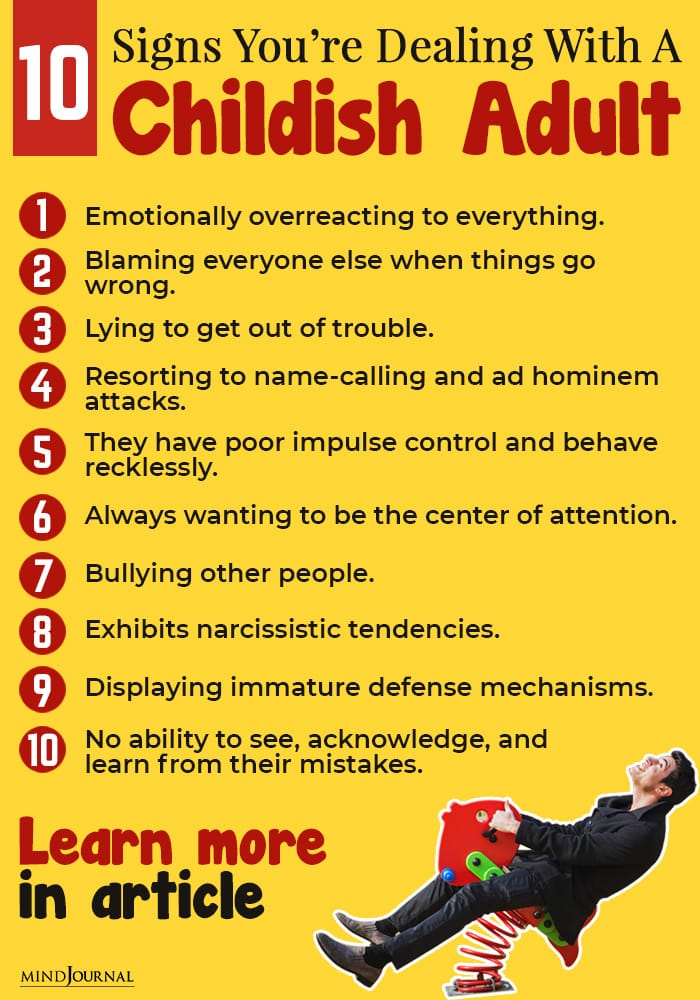
How do you know if you’re dealing with a childish adult? How many of the following signs of emotional immaturity does your list include?
1. Emotional escalations.
Young children often cry, get mad, or outwardly appear petulant and pouting. Grownups seldom do.
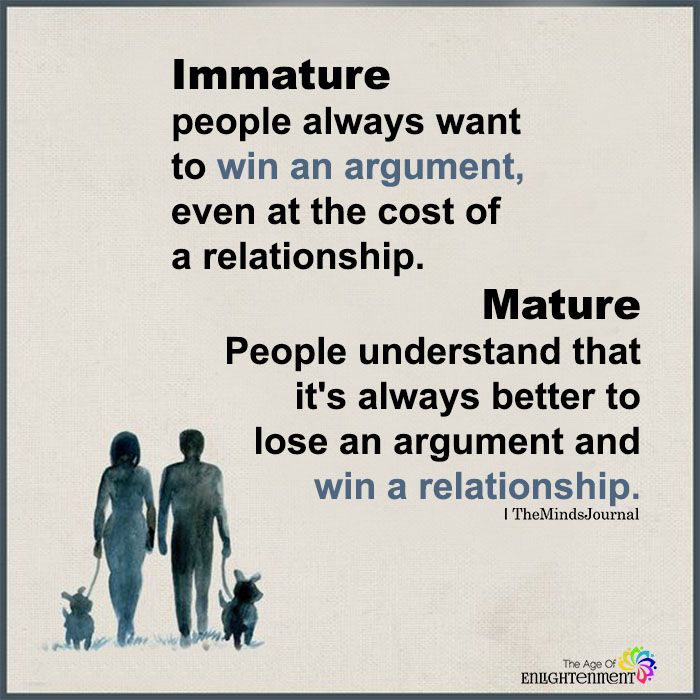
2. Blaming.
When things go wrong, young children look to blame someone. Grownups look to fix the problem.
3. Lies.
When there’s a situation that’s uncomfortable, young children might lie to stay out of trouble. Grownups deal with reality, reliably speaking the truth.
4. Name-calling.
Children call each other names. Adults seek to understand issues. Adults do not make ad hominem attacks, that is, attacks on people’s personality traits. Instead, they attack the problem. They do not disrespect others with mean labels.
There is one exception. Sometimes adults, just like firefighters who battle forest fires, have to fight fire with fire. They may need to use “fire” to manage an angry child or an out-of-bounds adult, in order to get them to cease their bad behavior.
5. Impulsivity—or as therapists say, “poor impulse control”.
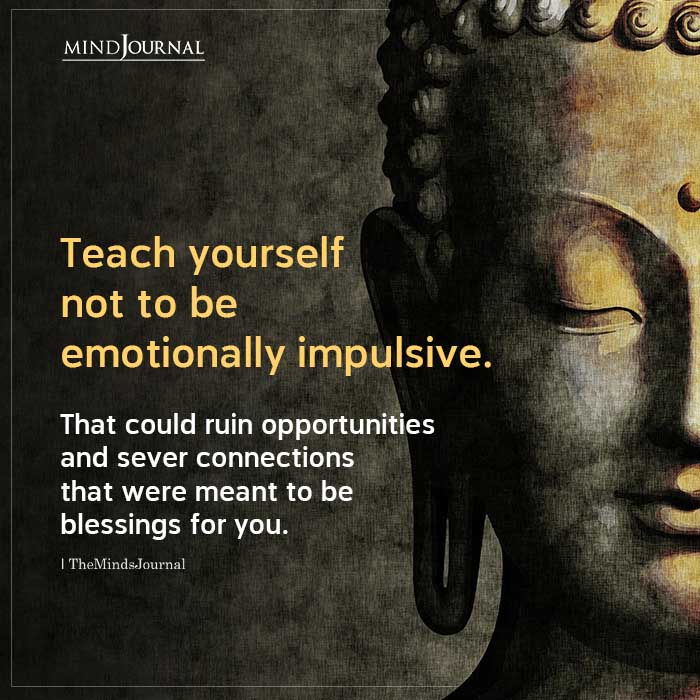
Children strike out impulsively when they feel hurt or mad. They speak recklessly or take impulsive action without pausing to think about the potential consequences. Similarly, instead of listening to others’ viewpoints, they impulsively interrupt them. Adults pause, resisting the impulse to shoot out hurtful words or actions. They calm themselves. They then think through the problem, seeking more information and analyzing options.
Again, some instances of acting on impulse can be hallmarks of mature behavior. Soldiers and police, for instance, are trained to discriminate rapidly between harmless and dangerous situations so that they can respond quickly enough to protect potential victims of criminal actions.
Related: Peter Pan Syndrome: What It Looks Like and How To Deal
6. Need to be the center of attention.
Ever tried to have adult dinner conversations with a two-year-old at the table? Did attempts to launch a discussion with others at the table result in the child getting fussy?
7. Bullying.
A child who is physically larger than other children his age can walk up to another child who is playing with a toy he would like and simply take it. The other child may say nothing lest the bully turns on them with hostility. In many cases, it’s safer just to let a bully have what he wants.
Adults, on the other hand, respect boundaries: Yours is yours and mine is mine.
8. Budding narcissism.
In an earlier post, I coined the term tall man syndrome for one way that narcissism can develop. If children—or adults—can get whatever they want because they are bigger, stronger, or richer, they become at risk for learning that the rules don’t apply to them. Whatever they want, they take.
This narcissistic tendency may initially look like strength. But in reality, it reflects a serious weakness: being unable to see beyond the self.
Psychologically strong people listen to others, hoping to understand others’ feelings, concerns and preferences. Narcissists hear only themselves and are emotionally brittle as a result. They operate like children who want to stay out and play—even though dinner is on the table—and who pitch a fit rather than heed their parent’s explanation that the family is eating now.
Their mindset, in short, is “It’s all about me.” In the eyes of a narcissist, no one else counts; if they don’t get their way, they may result in pouting or bullying in order to do so.
9. Immature defenses.
Freud coined the term defense mechanisms for ways in which individuals protect themselves and/or get what they want. Adults use defense mechanisms like listening to others’ concerns as well as to their own. They then engage in collaborative problem-solving. These responses to difficulties signal psychological maturity.
Children tend to regard the best defense as a strong offense. While that defensive strategy may work in football, attacking anyone who expresses a viewpoint different from what they want is, in life, a primitive defense mechanism.
Another primitive defense is denial: “I didn’t say that!” or “I never did that!” when in fact they did say or do the thing they claim not to have done. Sound childlike to you?
10. No observing ego—that is, no ability to see, acknowledge, and learn from their mistakes.
When emotionally mature adults “lose their cool” and express anger inappropriately, they soon after, with their “observing ego,” realize that their outburst was inappropriate. That is, they can see with hindsight that their behavior was out of line with their value system. They can see if their outburst has been, as therapists say, ego-dystonic (against their value system).
Children who have not yet internalized mature guidelines of respectful behavior toward others, or who have not developed ability to observe their behaviors to judge what’s in line and what’s out of line, see their anger as normal.
They regard their emotional outbursts as ego-syntonic, that is, perfectly fine, justifying them by blaming the other person. In other words, “I only did it because you made me.”
If you or someone you know functions more like a child than like a grown-up, what are your options?
Related: 6 Traits of Emotionally Immature People
It’s easy to love children who act like children. It’s harder to love someone who acts like a child in the body of a grownup. Still, most childlike adults-only act childishly when they feel under threat.
Therefore, if you love someone who has childish sides, one strategy is to focus primarily on the more adult and attractive aspects of the person. If you are the childlike one, love your strengths—and pay attention to growing in your less mature habit areas.
Another strategy is to cease being surprised when childish patterns emerge. Thinking, “I can’t believe that s/he/I did that!” signifies that you have not yet accepted the reality of the child-like behaviors. Accepting that the behaviors do occur is a first and vital step toward change.
Third, if you are the receiver of childish behaviors, beware of trying to change the other person. Instead, figure out what you can do differently so those patterns will no longer be problematic for you. Your job is to keep growing yourself, not to change others.
Lastly, learn the skills of adult functioning. Much of what grown-up “children” do can be considered as a skills deficit. If you tend to be childish, learning adult skills can move you into grownup-Ville.
And if you generally function as a grownup, the more clear you are about what constitutes grown-up behavior, the more you will be able to stay a grownup—even when you are interacting with someone who is acting like a child.
(c) Susan Heitler, Ph.D.
Want to know more about a childish adult? Check this video out below!
Written By Susan Heitler Originally Appeared In Psychology Today
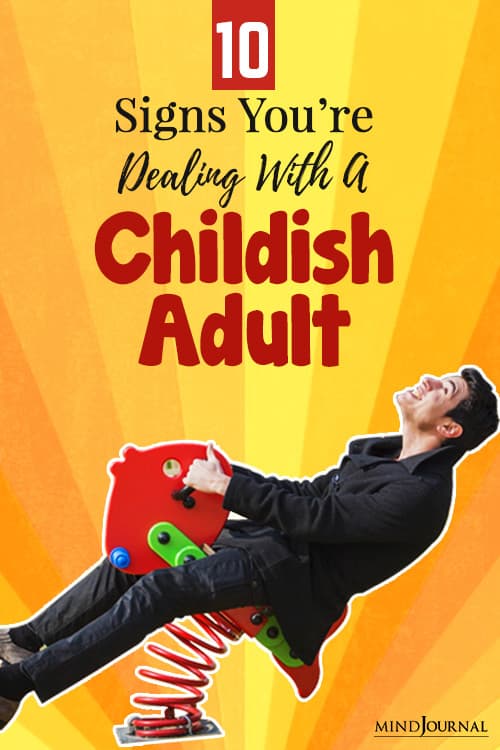

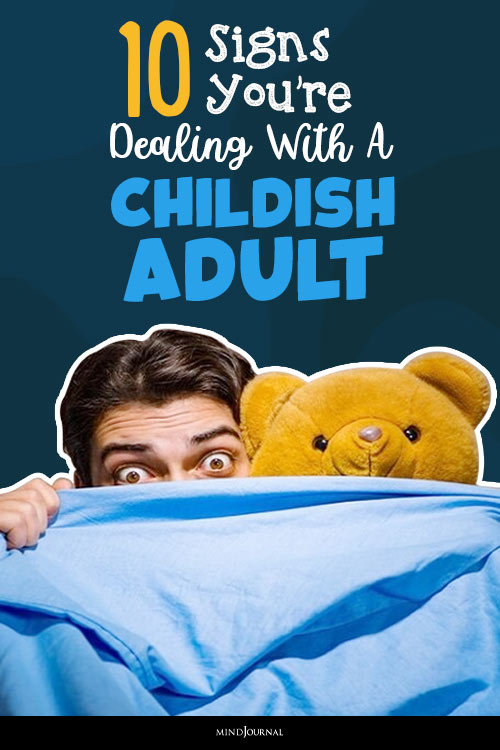

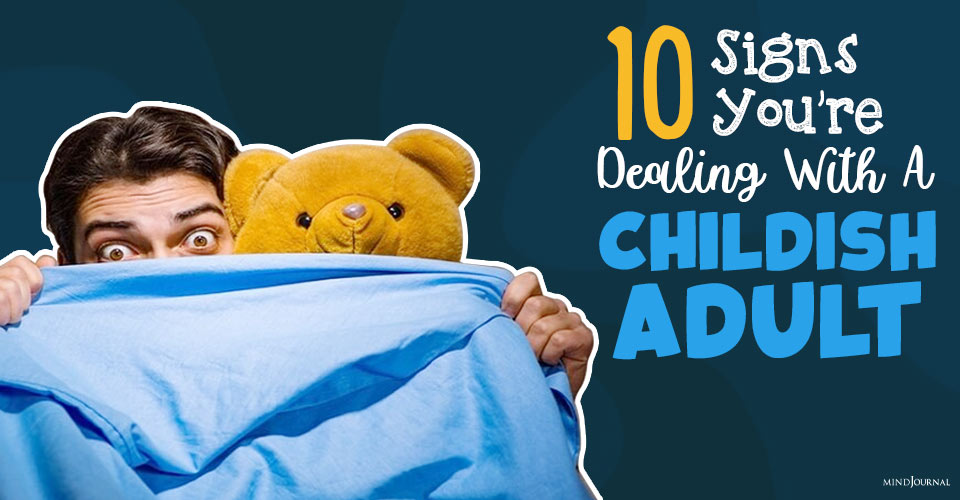


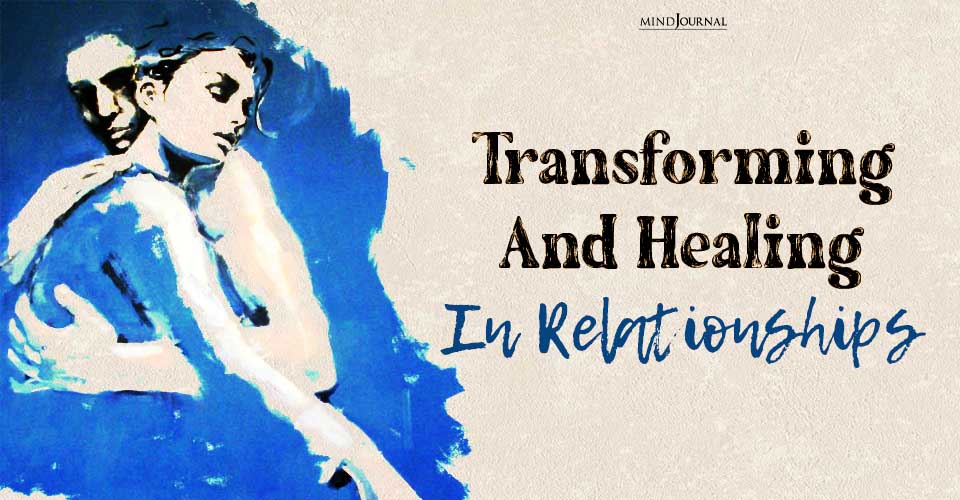

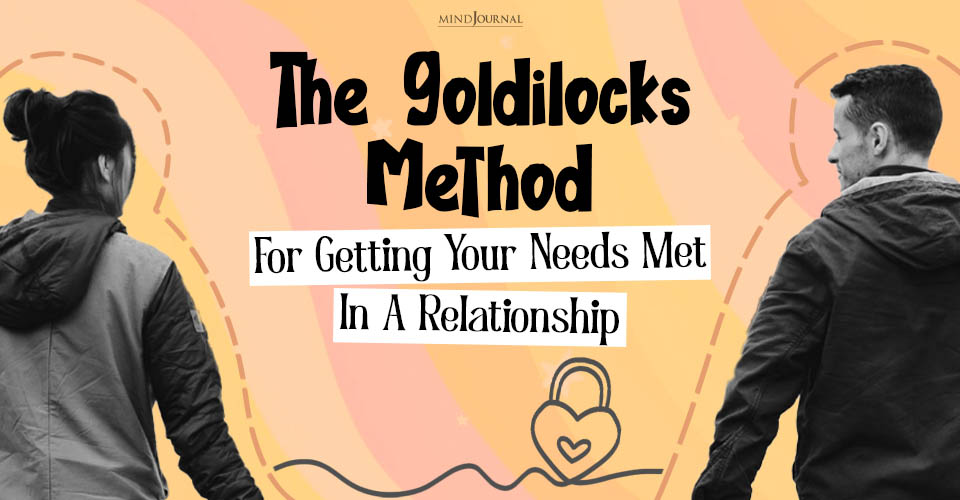


Leave a Reply